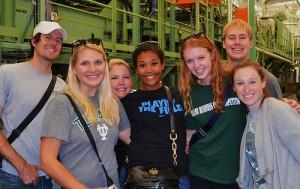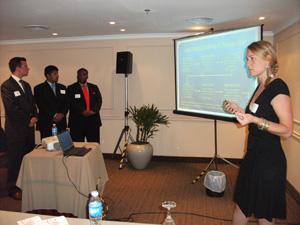MBAs practice business without borders in Argentina
Tom Connor (MBA ’12) has worked on a lot of consulting projects but probably none as simultaneously inspiring and sobering as the one he recently undertook for CILSA, an Argentinean nonprofit dedicated to helping at-risk children and the disabled access educational and career opportunities.

“There are a huge number of logistic, socioeconomic and cultural barriers they have to work around, so progress is often measured in inches,” Connor says. “I told the client the night before we left Buenos Aires, ‘I honestly don’t care about a grade. I just hope the work my team did helps you help your kids.’”
Connor was one of 80 Tulane MBA students who put their business skills to work for nonprofits in Buenos Aires as part of this year’s Global Leadership III course.
Last year about half the MBA class volunteered for public service work during their trip to Buenos Aires for the Global Leadership course. That initiative was so well received that public service was fully integrated into this year’s course.
Working in partnership with Help Argentina, an organization that connects people abroad with volunteer opportunities in the country, Freeman matched MBA students with four nonprofits in need of consulting services: Fundapaz, a producer of goat cheese made with milk from indigenous farmers; Reciduca, which provides job training and placement for at-risk youth funded in part through a recycling program; RACI, an umbrella group that supports nonprofits across Argentina; and CILSA, the group that Connor worked with.
The MBAs began working with the nonprofits in September, communicating via phone, Skype and email to learn more about each organization and the problems it was experiencing. Reciduca, for example, needed help identifying potential clients. Fundapaz was seeking recommendations on pricing and operations.
Working in teams of four, the MBAs spent eight weeks consulting with the organizations and then presented their final reports to the clients in person during their November program in Buenos Aires.

“We designed a complete outreach strategy for CILSA including contact timelines, a phone script, a form letter and even a few leads to contact,” Connor says. “Obviously, we’re not in Buenos Aires to help them out after this, so it was very important for us to give them a final deliverable that they could use by themselves.”
According to Director of Professional Education Stephen Estrada, who helped organize the project, the clients especially appreciated the templates and samples that students provided them with.
“That’s what they liked the best—the things that could be easily implemented,” Estrada says. “I think the clients were a little leery about what level of understanding the students were going to be able to get from such a distance. Considering the obstacles, they were surprised by how relatable and implementable the recommendations were.”
While public service is a requirement at Tulane’s undergraduate level, Freeman is the first graduate school at Tulane to begin to integrate service learning into its curriculum. According to Connor, that’s a move that benefits everyone.
“I think it’s important for MBAs to try to solve social problems, and it’s great that Tulane gives us that opportunity while we’re still in school,” Connor says. “I like getting the experience, I like helping people, and if I’m going to be a free MBA, I’d much rather it be for an organization that wouldn’t normally have access to the kinds of resources we can bring in.”
Interested in advancing your education and/or career? Learn more about Freeman’s MBA programs. Find the right program for you.
Recommended Reading
- Online vs. In-Person MBA: Benefits and Differences
- How to Stay Focused and Apply for an MBA
- How to Choose an MBA Concentration
- What Will You Learn in an MBA Curriculum?
- What Is a Professional MBA? Overview and Career Outcomes
- What Are Dual Master’s Degree Programs?
- Can I Get a Scholarship or Fellowship for Graduate School?
- Business Education Options: What Graduate Degree Should I Get?
Other Related Articles
- AI-powered fund takes top prize in Aaron Selber Jr. Hedge Fund Course
- Alum brings rugby mindset to new consulting program
- Keeping it cool: MBAs help Convention Center find its temperature sweet spot
- Investopedia: Rising Inflation and Slowing Growth Are Investors' Worst Nightmare
- Alum shares playbook on forensic accounting
- Freeman students make Madrid their classroom
- Three Freeman students awarded 2025-2026 Fulbright grants
- LEAP fellow helps NOLA entrepreneur build a better bottom line
